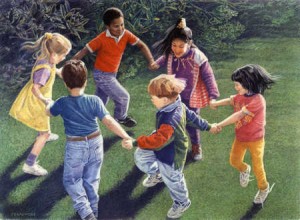The Poisonous Candy: Emergency Contraception for Kids
 A running controversy centers on the question of whether or not it is a good idea to provide pre-prescriptions of morning after pills to young people who have not yet reached the age of 17. This may not shock the vast majority of Americans who have come to assess sexual behavior in terms of safety from pregnancy rather than moral and mental health. But maybe it’s time for a reality check.
A running controversy centers on the question of whether or not it is a good idea to provide pre-prescriptions of morning after pills to young people who have not yet reached the age of 17. This may not shock the vast majority of Americans who have come to assess sexual behavior in terms of safety from pregnancy rather than moral and mental health. But maybe it’s time for a reality check.
The American Academy of Pediatrics (AAP) has approved a policy recommending the provision of contraception to teens because, according to its members, teens should be informed about their options so that they are prepared in case they have sex and need a backup plan.
As one report states, “The teenage impulsive decision-making process coupled with the fact that access to emergency contraception varies means teens are at best confused about how and when to access emergency contraception. In most states teens younger than 17 must obtain a prescription from a doctor to access emergency contraception. According to the AAP, teens are more likely to use emergency contraception if it has been prescribed in advance which would go a long way toward reducing teen pregnancy rates.”
This is a bogus claim, to be sure, and fortunately not all pediatricians are on board with this position. As some point out, placing a fifteen-year-old on a par with an adult when it comes to ingesting chemicals for the express purpose of avoiding or ending a pregnancy is unwise. According to LifeSiteNews: “The American College of Pediatricians recommends against a policy of pre-prescribing ‘emergency contraceptives’ to adolescents. Rather than facilitating adolescent sexual activity, health professionals need to encourage good adolescent-parental communication, teach adolescent patients the benefits of delaying sexual activity until marriage, and teach them how to avoid premature/promiscuous consensual sex and situations resulting in coerced sex.”
The debate over this subject troubles me for a variety of reasons, including health, well-being, education, and proper character building, which are all aspects of what it used to mean to raise a child and guide him along the path to maturity. This is the role a parent once played in raising a child, but in today’s upside down world of “me first” and the child-as-possession syndrome, those qualities of parenting have been lost among a growing number of American parents.
Not uncharacteristically, even the prestigious Heritage Foundation has weighed in on the topic. A recent “Family Fact of the Week” report confirms my theory stating that teens in intact families are less likely than their peers living in single parent families to have sex or to be in danger of pregnancy. In addition, “Teen girls deserve to be informed of the serious consequences of early sexual activity. Sexually active adolescent girls are more likely to experience depression and have lower academic performance. Teen girls who begin having sex in high school tend to have more sex partners during their lifetime than women who remain abstinent until early adulthood.”
The clear and undeniable conclusion one draws from this current discussion is clear. The problematic nature of making a fifteen-year-old feel like and adult in matters of sexual pleasure and experience will reap nothing but negative results. It is the equivalent of shattering childhood in favor of ensuring that children know more about how to avoid pregnancy than they do about appreciating who they are as persons.
The result is that most children do not learn that it is possible to live the virtue of chastity by understanding the meaning of purity.
Why?
Most parents are too busy. They have careers, they have bills, they have lives—and their children are just, well, there. Since this is the case in far too many homes, is it any wonder that the AAP and its ilk feel they have an obligation to step in and save these young sexually motivated creatures from themselves since, after all, they are going to have sex anyway and Mommy and Daddy couldn’t care less?
In today’s culture, candy is for children, and birth control chemicals that maim, kill, and destroy are for teens. Whether unwittingly or on purpose, too many parents are condemning their children to lives of enslavement to sexual pleasure because of their own disinterest in character formation.
The antidote is what it has always been—sacrificing for those we love before we think about ourselves. The sweet salve of unconditional love can heal all wounds, including those caused by the sex savants who are lurking ever so close to our children.

